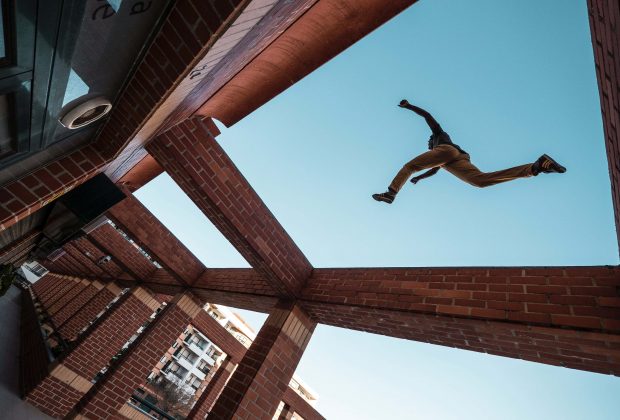Over the course of the last decade or so, we’ve seen a rise in fringe sports, some of which are stretching that very label as they seek to go mainstream. The example that will first come to mind for some is undoubtedly eSports. This is essentially another name for competitive gaming, and it’s an organized activity that’s now selling out venues and rivaling conventional sports for viewership and streaming numbers. Drone racing is another example.

This activity (which for those who aren’t familiar is just what it sounds like) hasn’t enjoyed quite as steady a rise as eSports, but it has gotten big enough to secure a few major television deals in the last couple years. Perhaps even more “fringe” is the rise of Spikeball, a game popularized in part by an appearance on ABC’s. Shark Tank but which has since sparked organized professional competition.
The question we’re asking here is whether or not something similar could happen with parkour. The sport’s obvious disadvantage, compared to eSports, drone racing, or Spikeball, is that it is not inherently competitive. It is in some sense more of an activity, exercise, or challenge than a game or sport. However, given this complication, there are still some avenues that could lead to parkour’s emergence as a fringe sport as well.
First and foremost would be more publicity, ideally on an international scale. Parkour really hit the mainstream, so to speak, as an early YouTube sensation (you might recall the episode of The Office in which a few characters got in on the craze), but it has since remained a sort of spectator hobby. This would probably need to change if it were to grow as a sport. It may happen naturally, to some extent and in isolated incidents. For example, parkour was actually mentioned in a fairly recent article about street sports gaining ground in Japan which could be significant as 2020. Tokyo Olympics shine a spotlight on the country’s sports scene. Still, though, there would need to be marketing and exposure efforts.
Maybe most important of all, concrete rules would also need to be established, even if they were to involve judgment. This might rub some people the wrong way, but several major sports still involve judges (or human referees for that matter), and this may be the best way for parkour to standardize itself in a competitive form. Right now there are of course various parkour competitions out there. But what we’re suggesting here is that there would need to be universal, easy-to-understand rules for professional events.
If rules were established and competitions gained more exposure, the sport-like nature of parkour would be more standardized, and it could then take another big step forward by appearing in betting markets. Right now, the U.S. is in the gradual process of legalizing betting and turning it into a more everyday aspect of sports. New Jersey started things off with a gambling industry that was essentially ready and waiting to blow up once it was cleared to act legally, and the activity has spread further since. Pennsylvania is allowing sports betting online now as well, not quite on the scale of New Jersey but on that path, and a few other states are also getting on board. Some others still, like New York, are allowing gambling activity at in-state casinos, even if not online yet. This is all part of what’s expected to blossom into a massive industry, and sports and events of all kinds are going to be listed for people to bet on. If parkour competitions are understood and standardized, they could be included among some of those gambling listings in time, which could ultimately lead to a greater air of legitimacy - and new fans.
Of course, with all of this exposure, there would also need to be new avenues by which to watch the competitions themselves. A TV deal would be parkour’s biggest ticket to rising-sport status, but in the early going it’s likely streaming would be the play. Either through a sponsor, an attachment to an existing streaming network or through its own app, a competitive parkour league would need to make it easy for fans to tune in and watch the action.
Provided all of this, the sport would, at least in theory, be able to grow on its own. It would be understood more easily over time thanks to concrete rules; it would generate more financial activity through a growing betting market, and it would reach fans through any kind of digital spectatorship option. Then, the hope would simply be that the action would be compelling enough to keep fans interested, and that new stars and star teams would develop their own fan bases, and thereby grow the sport even more.






